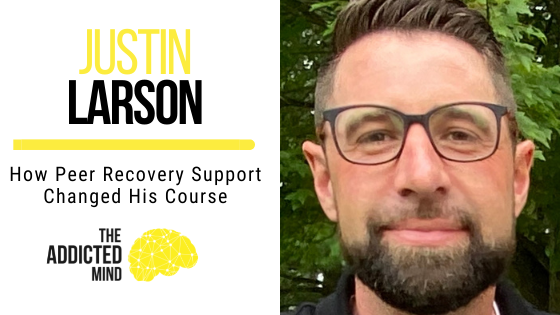On this episode of The Addicted Mind Podcast, Duane speaks with Justin Larson, the director of health systems for Thrive Peer Recovery, as he shares his story about his alcoholism and recovery.
Justin was diagnosed with depression at the young age of eight. He was feeling fearful and anxious all the time until that time he picked up a drink and it just made all of those go away. At that moment, he fell in love with alcohol. Soon, it became his best friend that later controlled his life.
Drinking became his number one coping mechanism. For him, it was the missing link to life, having found the one thing that enabled him to cope with life. From about the age of 15 to 32, what started out as this magic elixir that gave him the courage and made him feel whole, slowly turned into a necessity that he couldn’t go without. Alcohol slowly turned down on him.
It reached a point in Justin’s life where he ran out of options for dealing with all his pain. He found himself in such a dark place that the only thing he could do was attempt suicide. Fortunately, Justin decided to seek treatment.
Justin saw the value of peer recovery support because it assured him that he was not alone. Having gone through hell and clawed his way out of it, he wanted to pay it forward by helping others, who are going through the same path, claw their way out of the deep pit, too.
In this episode, you will hear:
- Being diagnosed with depression at age 8
- The decision to seek treatment
- The importance of peer recovery support
- What makes being with a peer unique
- The difference between a peer supporter and a counselor or therapist
- The role of a peer supporter
Key Quotes:
[09:37] – “That’s a dangerous place to be in when I will do anything possible to get that next drink.”
[11:13] – “The alcohol was my best friend since I picked it up at a young age.”
[21:51] – “I went through hell and clawed my way out of it. And I want to be able to lend my hand to others to help them get out of that, too.”
[23:47] “It’s a very organic conversation that comes up between a peer and a peer recovery supporter. It’s that identification piece that the peer can relate to the peer recovery supporter.”
[28:12] – “It’s part of that clinical team. But it’s a non-clinical role that sometimes fills the void.”
[31:37] – “There’s no greater high than helping others.”
[32:06] – “Hold on, it gets better. I know what you’re going through. I’ve been there myself. It seems like there’s no options, and there’s no way out.”
[32:28] – “Please accept the help. Please be willing to make a change. I know it’s scary. It was for me. But it’s so worth it.”
Subscribe and Review
Have you subscribed to our podcast? We’d love for you to subscribe if you haven’t yet.
We’d love it even more if you could drop a review or 5-star rating over on Apple Podcasts. Simply select “Ratings and Reviews” and “Write a Review” then a quick line with your favorite part of the episode. It only takes a second and it helps spread the word about the podcast.
If you really enjoyed this episode, we’ve created a PDF that has all of the key information for you from the episode. Just fill in your information below to download it.

